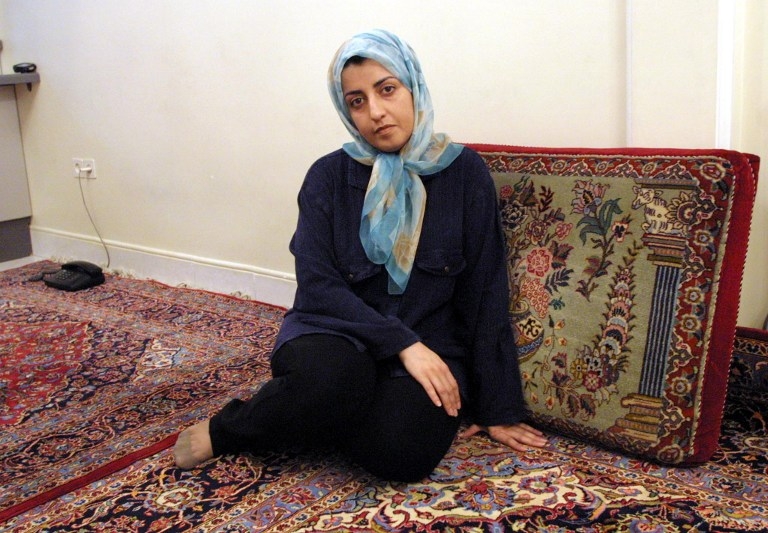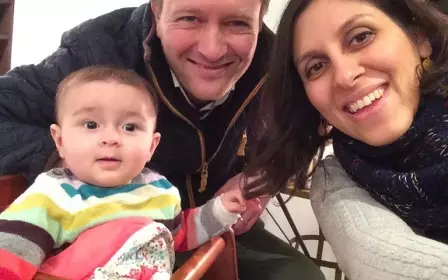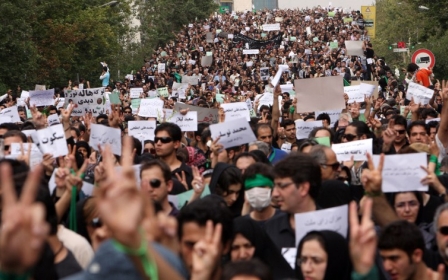Iranian spends birthday in jail for campaign against death penalty

Today, human rights campaigner Narges Mohammadi celebrates her 45th birthday in Iran's notorious Evin prison. Her crime is campaigning against the death penalty.
She faces another nine years in jail, and has already been held on various charges since May 2015.
"Mohammadi has not committed any crime," Roya Boroumand, a human rights activist, told Middle East Eye.
"She simply refused to be silent on human rights abuses and has tried, along with others, to bring an end to the abuse of death penalty in Iran."
'She simply refused to be silent on human rights'
- Roya Boroumand, Iranian activist
The heavy sentence "underline Iran's authorities fear of truth-telling", added Boroumand, the co-founder of the Abdorrahman Boroumand Foundation.
Mohammadi was convicted in 2016 of "gathering and colluding to commit crimes against national security", "spreading propaganda against the system" and "founding a group composed of more than two people with the purpose of disrupting national security", according to Amnesty.
The latter charge, which carried a 10-year sentence, was for her involvement with the Campaign for Step by Step Abolition of the Death Penalty, known by its Persian acronym, Legam.
During her interrogation and trial, according to Amnesty, authorities described Mohammadi's peaceful campaigning as "un-Islamic" and said her opposition to the death penalty "insulted Islam".
Iran carries out the second highest number of death penalties in the world after China, and last year executed at least 567 people, according to a report from Amnesty.
"Condemning Narges Mohammadi to years in prison simply for campaigning against the death penalty is a testament to the dire situation of human rights defenders in Iran," Nassim Papayianni, Iran researcher at Amnesty, tells MEE.
"Instead of cracking down on human rights defenders who oppose the death penalty, the Iranian authorities must address their appalling execution record."
Chronic health issues
Mohammadi also has chronic health issues, including neurological problems, Amnesty says.
Her health is suffering, the group says, as the Iranian authorities are not consistently taking Mohammadi to the necessary bi-weekly appointments that will monitor her blood density, and prevent blood clots in her lungs.
Mohammadi was last year allowed to speak to her two children, who live in Paris with their father, once, and that was only after a 20-day hunger strike, after being denied phone contact.
"Rather than being forced to spend another birthday behind bars, Narges Mohammadi should be freed immediately and unconditionally and allowed to continue with her important human rights work," Papayianni said.
"While Narges Mohammadi has been recognised internationally for her courageous human rights work, the Iranian authorities have outrageously decided to punish her with a harsh prison sentence."
Tara Sepehri Far, an Iran researcher at Human Rights Watch, said Mohammadi's case exemplifies the limits to the work of human rights defenders in the country.
"Mohammadi's case is a perfect example of what a human rights defender might face solely for peaceful activism," Sepehri Far told MEE.
"The evidence used against her in the Revolutionary Court is sufficient to prove that she hasn't committed any wrongdoing and shouldn't spend any time in prison."
But for Boroumand, Mohammadi is also a source of inspiration and hope.
"She believes Iranians have a right to enjoy their fundamental human rights and is not intimidated by threats and persecution," she said.
"It is important for the international community, including the media, to remind her jailers that she remains relevant and will not be forgotten.
"This is also a message of hope for all those who are fighting for human rights and are paying a price to bring about change in Iran's human rights situation."
New MEE newsletter: Jerusalem Dispatch
Sign up to get the latest insights and analysis on Israel-Palestine, alongside Turkey Unpacked and other MEE newsletters
Middle East Eye delivers independent and unrivalled coverage and analysis of the Middle East, North Africa and beyond. To learn more about republishing this content and the associated fees, please fill out this form. More about MEE can be found here.




